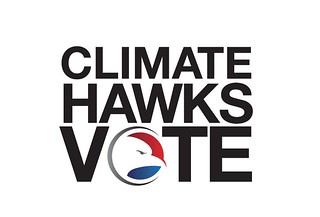Is the Trans Pacific Partnership actually bad for the climate? I confess that in 2013, I dismissed concerns as overblown; in 2014, I got that it was bad, but "not my issue" - I would stand in solidarity with labor, those working on traditional environmental issues, and fellow progressives; but wouldn't actively engage.
 Then I decided to get past the rhetoric and take a closer look.
Then I decided to get past the rhetoric and take a closer look.
And it's alarmed me sufficiently that Climate Hawks Vote is going to score members of Congress on their climate-related statements on the TPP.
Below the orange hawk's nest, the highly shareable analysis I provided to a member of Congress upon request.
I've read the TPA ("fast track bill") but not the TPP - only members of Congress can do that. I provided this to the member of Congress. And because I'm posting it on DailyKos, I'm hoping that fellow Kossacks do the same!
Initially, TPA is silent on climate change. Section 2(b)(10), on principal trade negotiating objectives, subsection on labor and the environment, doesn’t mention climate change at all. The environment chapter of the TPP is said to address conservation and habitat issues, not climate change.
Rep. Sander Levin, who has seen the TPP text, gave a speech May 21 in which he stated: “The Hatch-Wyden-Ryan TPA bill is obsolete in providing instructions [on environment] since the TPP is already taking a different approach. The TPA bill also does not address whether or how climate change issues should be handled in TPP, an issue raised by other countries in the TPP negotiations.”
Analysis by NRDC suggests that although TPP incorporates a list of international environmental treaties that the TPP-signing countries are to “adopt, implement, and maintain,” a global climate treaty is not on that list. (And, given Congressional hostility to any climate treaty in Paris this December, I don’t expect that to change.)
So at best, TPP avoids climate altogether and TPA deliberately obfuscates matters.
TPP acts to increase exports of carbon emissions. In particular, the Sierra Club has written a report, Raw Deal, which is highly critical of two points: exports of liquefied natural gas and the investor-state dispute resolution provision.
“Analysts agree that energy, particularly natural gas, will be a major focus of the agreement.” On the first point, the TPP apparently would give “national treatment for exports of natural gas,” which means that the Department of Energy would be legally bound to automatically approve all exports of LNG without any review, modification, or delay. LNG is fracked natural gas with disturbing (albeit disputed) methane leakage reports. The Sierra Club report also argues persuasively that large scale LNG exports mean a tightening of the domestic natural gas supply, and thus higher natural gas prices and more coal. (Despite the “war on coal rhetoric, market forces, specifically cheap natural gas, have as much to do with coal’s slide as government regulations.) A new High Country News story illustrates how the TPP could enable Rifle, Colorado frackers to sell LNG to Japan.
The investor-state dispute settlement (ISDS) provision gives corporations expansive new rights to sue states when state regulations interfere with corporate profits. The Sierra Club report lists two energy-related examples: fracking in Quebec and nuclear energy in Germany. Occidental Oil successfully sued Peru for $2.4 billion under the US-Ecuador Bilateral Investment Treaty, which has a (presumed) similar provision.
Of particular note: California is a ripe lawsuit target thanks to its ambitious greenhouse gas reduction actions. (Apparently the ISDS provision is set up so that the United States would be sued with respect to rules/regulations by any state, whether California or West Virginia.) A similar provision in NAFTA prompted then-California Gov. Arnold Schwarzenegger to veto a 2005 California bill requiring the use of recycled tires in asphalt road construction.
Finally, signatories to the TPP other than the US have big carbon projects - Australia’s Galilee Basin and the Canadian tar sands are the biggest. If Australia were to be sued over coal regulations, the climate loses even if the United States’ carbon remains untouched and its record defending ISDS lawsuits remains unblemished.
For this reason, Climate Hawks Vote is going to score members of Congress on their statements on the TPP, if it's related to natural gas, fracking, or other climate issues. Unlike other scorecards, we track members of Congress on leadership as well as votes. For example, we'll score positively this op-ed by climate hawk Jared Huffman,
Not Down with the TPP:
Instead of unifying the United States and Pacific Rim nations behind an aggressive greenhouse-gas-reduction plan, the proposed Trans-Pacific Parternership (TTP) trade agreement could threaten our forests, wildlife, oceans, climate, public health and middle-class jobs. It would spur natural gas exports and increase fracking, putting our water at risk and further cementing our addiction to fossil fuel.
And I hope that other Democratic members of Congress will join Rep. Huffman in speaking out on this progressive priority.


